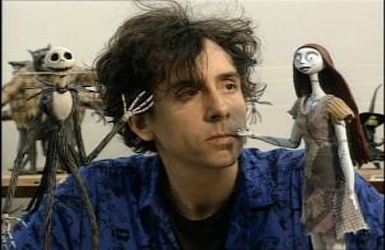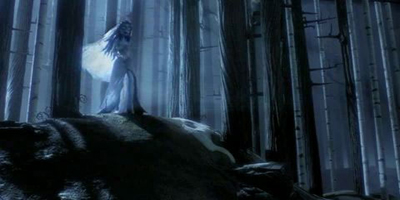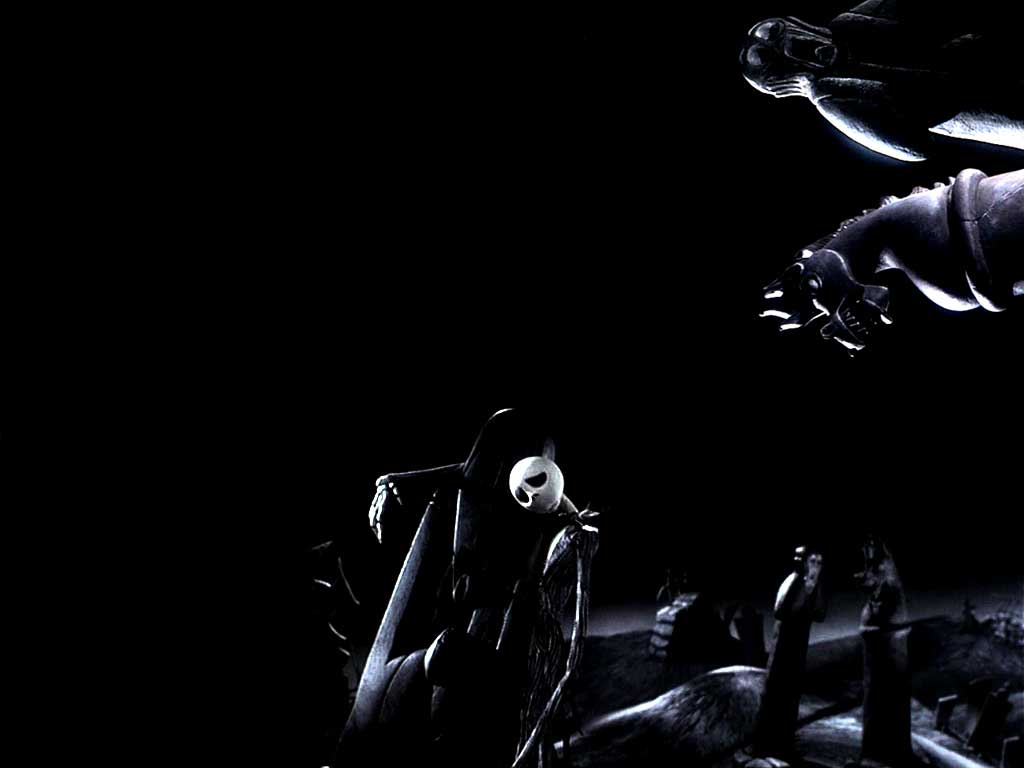
Born in Burbank, California, the first of two sons to Bill Burton and Jean Erickson. Burton described his childhood self as quirky, self-absorbed and highly imaginative. He found home life and school difficult and he escaped the reality of everyday life by watching horror and low budget films, to which he would later pay tribute in his biography of Edward D. Wood, Jr. Another film figure of importance in Burton's childhood is Vincent Price, whose filmography would deeply influence the upcoming director's career. Following high school, he won a Disney scholarship to attend the California Institute of the Arts in Valencia, California. He studied animation for three years and was then hired by the Walt Disney Studios as an animator apprentice. The first film he worked on was Ralph Bakshi's adaptation of The Lord of the Rings, for which he is uncredited. Later, Burton's job was to draw for The Fox and the Hound, which wasn't exactly the direction he had wanted to go at the time.
Early career In 1982, Burton made his first short film, Vincent, a six-minute film about a young boy who flashes from reality into a fantasy where he is Vincent Price, with Price himself providing narration. This was followed by the live-action short Frankenweenie, starring a young Barret Oliver (as well as Sofia Coppola in a minor part). The film, shot in black and white, was a reenactment of the story of Frankenstein where the mad scientist was replaced by a young Victor (Oliver) reanimated his dead dog after he was killed in a road accident. The film was deemed unsuitable for children because of its "gruesome" concept and was quickly shelved. Despite being unknown to the public, Burton's projects attracted the attention of the film industry, and after seeing Frankenweenie, TV-host/Actor Paul Reubens (better known as Pee-Wee Herman) hired Burton to direct the movie rendition of his TV show. The movie, Pee-Wee's Big Adventure (1985), was made on a budget of $7 million and grossed more than $40 million at the box office. Burton was a lifelong fan of the band Oingo Boingo and asked member Danny Elfman to provide the music for the film. Since then Elfman has provided the score for all but one Burton film, Ed Wood, which was scored by Howard Shore. According to Griffin Dunne, he had also approached Burton to direct After Hours (1985), which would have been Burton's first feature-length film. The script was previously presented to Martin Scorsese by Dunne and producer Amy Robinson, but Scorsese was preparing to shoot The Last Temptation of Christ and had to decline. Burton accepted, but when financing for The Last Temptation of Christ fell through, Scorsese contacted Dunne and Robinson, offering to direct After Hours. When Dunne informed Burton of Scorsese's renewed interest, he graciously bowed out of the project out of respect for Scorsese. After "Pee-Wee", Burton participated in the TV series "Alfred Hitchcock Presents", directing the episode "The Jar". He then went on to direct his second movie, Beetlejuice (1988) starring Michael Keaton in the title role. The dark-humour comedy was another hit for Burton, grossing $80 million and bagging an Academy Award for best makeup. Burton's ability to produce hits with low budgets impressed studio executives and he received his first big budget film Batman (1989). The production of the film, one of the biggest of all time in 1989, was beset with difficulties and the hollywood rumor mill claimed that it was in big trouble. Burton's choice of casting Michael Keaton as the caped crusader was not well received by fans. However, by the time film production wrapped, a batmania frenzy took over (thanks to the biggest marketing campaign in movie history at this date), and Batman became a huge success, grossing $250 million and ultimately bringing a darker feel to superhero movies in general.
The 1990s In 1990, Burton co-wrote (with Caroline Thompson) and directed Edward Scissorhands, which started his collaboration with Johnny Depp. Depp, a teen idol at the end of the 80s due primarily to his work on the hit TV series 21 Jump Street, was cast in the title role of Edward, who was the creation of an eccentric and old fashioned inventor (played by Vincent Price, in his last appearance on screen before his death). Edward looked human, but because unfinished, was left with scissors in the place of hands. Set in suburbia, the film is largely seen as Burton's autobiography of his own childhood in the suburb of Burbank. Price at one point said, "Tim is Edward." Johnny Depp has also made a similar comment in the foreword to Mark Salisbury's book, Burton on Burton, regarding his first meeting with Burton over the casting of the film. By the end of Edward, Burton finally agreed to direct a sequel to Batman on the condition that he would be granted total control. The result was Batman Returns, which featured Keaton returning as the Dark Knight, Danny De Vito (as the Penguin), Michelle Pfeiffer (as Catwoman), and Christopher Walken. The movie's dark and gothic feel, as well as the S and M styling of Catwoman's costume left audiences confused and puzzled, which led to a lower box office hit. This was compounded by Burton's decision to focus the storyline more on the villains instead of Batman (though this was also somewhat true of the previous film). Batman Returns grossed $160 million, much less than expected, and Burton left the Batman franchise from this point on (though he returned as a producer for Batman Forever (1995), a movie which he said had a title "like a tattoo you get when you're on drugs"). He wrote the original story for and produced, but did not actually direct, The Nightmare Before Christmas (1993), originally meant to be a children's book in rhyme. The film was directed by Henry Selick and written by Michael McDowell and Caroline Thompson, based on Burton's original story. Burton collaborated with Selick again for James and the Giant Peach (1996), which Burton co-produced. His next film, Ed Wood (1994), was of a much smaller scale, depicting the life of Ed Wood Jr., a filmmaker sometimes called "the worst director of all time". Again starring Depp in the title role, the film is an homage to Burton's childhood full of low budget movies. This is evident in the director's struggle for recognition through adversity. Ed Wood is the only Burton film so far to feature a score not by Danny Elfman. The music for Ed Wood was written by Howard Shore. The creative duo reunited for Mars Attacks! (1996). Based on a popular science fiction trading card series, the film was a spoof of blockbusters such as Independence Day and used B-movie imagery from 1950s sci-fi films. Panned by critics and audiences alike, the film still managed to gather a fan base from its TV runs and DVD exploitations. The film, along with Burton's next project Sleepy Hollow (1999) are viewed as a turning point in his career and style, leaving his dark themes and gothic imagery to move toward a more Hollywood-friendly style. Sleepy Hollow was released in 1999, again starring Depp (as Constable Ichabod Crane), a host of Burton regulars in supporting roles (Michael Gough, Jeffrey Jones and Christopher Walken, among others) and Christina Ricci as Katrina Anne van Tassel. Mostly well received by critics, and with a special mention to Elfman's especially gothic score, the film won an Academy Award for best art direction as well as two BAFTAs for best costumes and production designs. A box office success, rebounding after the Mars Attacks demise, Sleepy Hollow was also a turning point for Burton. Along with change in his personal life (separation from Lisa Marie), Burton changed radically in style for his next project, leaving the haunted forests and colorful outcasts behind to go on to directing a remake of Planet of the Apes. Among the projects Burton was attached to during the 90's were an adaptation of the manga Mai, the Psychic Girl, which was to have starred Winona Ryder as the titular character, Mary Reilly, which Stephen Frears ended up directing, and The Hawkline Monster, based on the Richard Brautigan novella, which would have featured Clint Eastwood and Jack Nicholson.
The 2000s Planet of the Apes was a commercial success, grossing $68 million in its opening weekend. The film was a significant departure from Burton's usual style, and there was much subsequent debate about whether the film was really Burton's, or if he was just a "hired gun" who did what he was asked. [1] Burton went on to direct Big Fish (2003), Charlie and the Chocolate Factory (2005) and Corpse Bride (2005), for which he received an Academy Award nomination for Best Animated Feature Film. In addition to his film work, he has also written the book The Melancholy Death of Oyster Boy: and Other Stories, a book about misfit children such as Oyster Boy, Match Girl, Stainboy (who used to have his own flash cartoon series on atomfilms.com), the Girl Who Turned into a Bed, and other such outcasts. Tim Burton has also directed the new video for rock band The Killers.
Early career In 1982, Burton made his first short film, Vincent, a six-minute film about a young boy who flashes from reality into a fantasy where he is Vincent Price, with Price himself providing narration. This was followed by the live-action short Frankenweenie, starring a young Barret Oliver (as well as Sofia Coppola in a minor part). The film, shot in black and white, was a reenactment of the story of Frankenstein where the mad scientist was replaced by a young Victor (Oliver) reanimated his dead dog after he was killed in a road accident. The film was deemed unsuitable for children because of its "gruesome" concept and was quickly shelved. Despite being unknown to the public, Burton's projects attracted the attention of the film industry, and after seeing Frankenweenie, TV-host/Actor Paul Reubens (better known as Pee-Wee Herman) hired Burton to direct the movie rendition of his TV show. The movie, Pee-Wee's Big Adventure (1985), was made on a budget of $7 million and grossed more than $40 million at the box office. Burton was a lifelong fan of the band Oingo Boingo and asked member Danny Elfman to provide the music for the film. Since then Elfman has provided the score for all but one Burton film, Ed Wood, which was scored by Howard Shore. According to Griffin Dunne, he had also approached Burton to direct After Hours (1985), which would have been Burton's first feature-length film. The script was previously presented to Martin Scorsese by Dunne and producer Amy Robinson, but Scorsese was preparing to shoot The Last Temptation of Christ and had to decline. Burton accepted, but when financing for The Last Temptation of Christ fell through, Scorsese contacted Dunne and Robinson, offering to direct After Hours. When Dunne informed Burton of Scorsese's renewed interest, he graciously bowed out of the project out of respect for Scorsese. After "Pee-Wee", Burton participated in the TV series "Alfred Hitchcock Presents", directing the episode "The Jar". He then went on to direct his second movie, Beetlejuice (1988) starring Michael Keaton in the title role. The dark-humour comedy was another hit for Burton, grossing $80 million and bagging an Academy Award for best makeup. Burton's ability to produce hits with low budgets impressed studio executives and he received his first big budget film Batman (1989). The production of the film, one of the biggest of all time in 1989, was beset with difficulties and the hollywood rumor mill claimed that it was in big trouble. Burton's choice of casting Michael Keaton as the caped crusader was not well received by fans. However, by the time film production wrapped, a batmania frenzy took over (thanks to the biggest marketing campaign in movie history at this date), and Batman became a huge success, grossing $250 million and ultimately bringing a darker feel to superhero movies in general.
The 1990s In 1990, Burton co-wrote (with Caroline Thompson) and directed Edward Scissorhands, which started his collaboration with Johnny Depp. Depp, a teen idol at the end of the 80s due primarily to his work on the hit TV series 21 Jump Street, was cast in the title role of Edward, who was the creation of an eccentric and old fashioned inventor (played by Vincent Price, in his last appearance on screen before his death). Edward looked human, but because unfinished, was left with scissors in the place of hands. Set in suburbia, the film is largely seen as Burton's autobiography of his own childhood in the suburb of Burbank. Price at one point said, "Tim is Edward." Johnny Depp has also made a similar comment in the foreword to Mark Salisbury's book, Burton on Burton, regarding his first meeting with Burton over the casting of the film. By the end of Edward, Burton finally agreed to direct a sequel to Batman on the condition that he would be granted total control. The result was Batman Returns, which featured Keaton returning as the Dark Knight, Danny De Vito (as the Penguin), Michelle Pfeiffer (as Catwoman), and Christopher Walken. The movie's dark and gothic feel, as well as the S and M styling of Catwoman's costume left audiences confused and puzzled, which led to a lower box office hit. This was compounded by Burton's decision to focus the storyline more on the villains instead of Batman (though this was also somewhat true of the previous film). Batman Returns grossed $160 million, much less than expected, and Burton left the Batman franchise from this point on (though he returned as a producer for Batman Forever (1995), a movie which he said had a title "like a tattoo you get when you're on drugs"). He wrote the original story for and produced, but did not actually direct, The Nightmare Before Christmas (1993), originally meant to be a children's book in rhyme. The film was directed by Henry Selick and written by Michael McDowell and Caroline Thompson, based on Burton's original story. Burton collaborated with Selick again for James and the Giant Peach (1996), which Burton co-produced. His next film, Ed Wood (1994), was of a much smaller scale, depicting the life of Ed Wood Jr., a filmmaker sometimes called "the worst director of all time". Again starring Depp in the title role, the film is an homage to Burton's childhood full of low budget movies. This is evident in the director's struggle for recognition through adversity. Ed Wood is the only Burton film so far to feature a score not by Danny Elfman. The music for Ed Wood was written by Howard Shore. The creative duo reunited for Mars Attacks! (1996). Based on a popular science fiction trading card series, the film was a spoof of blockbusters such as Independence Day and used B-movie imagery from 1950s sci-fi films. Panned by critics and audiences alike, the film still managed to gather a fan base from its TV runs and DVD exploitations. The film, along with Burton's next project Sleepy Hollow (1999) are viewed as a turning point in his career and style, leaving his dark themes and gothic imagery to move toward a more Hollywood-friendly style. Sleepy Hollow was released in 1999, again starring Depp (as Constable Ichabod Crane), a host of Burton regulars in supporting roles (Michael Gough, Jeffrey Jones and Christopher Walken, among others) and Christina Ricci as Katrina Anne van Tassel. Mostly well received by critics, and with a special mention to Elfman's especially gothic score, the film won an Academy Award for best art direction as well as two BAFTAs for best costumes and production designs. A box office success, rebounding after the Mars Attacks demise, Sleepy Hollow was also a turning point for Burton. Along with change in his personal life (separation from Lisa Marie), Burton changed radically in style for his next project, leaving the haunted forests and colorful outcasts behind to go on to directing a remake of Planet of the Apes. Among the projects Burton was attached to during the 90's were an adaptation of the manga Mai, the Psychic Girl, which was to have starred Winona Ryder as the titular character, Mary Reilly, which Stephen Frears ended up directing, and The Hawkline Monster, based on the Richard Brautigan novella, which would have featured Clint Eastwood and Jack Nicholson.
The 2000s Planet of the Apes was a commercial success, grossing $68 million in its opening weekend. The film was a significant departure from Burton's usual style, and there was much subsequent debate about whether the film was really Burton's, or if he was just a "hired gun" who did what he was asked. [1] Burton went on to direct Big Fish (2003), Charlie and the Chocolate Factory (2005) and Corpse Bride (2005), for which he received an Academy Award nomination for Best Animated Feature Film. In addition to his film work, he has also written the book The Melancholy Death of Oyster Boy: and Other Stories, a book about misfit children such as Oyster Boy, Match Girl, Stainboy (who used to have his own flash cartoon series on atomfilms.com), the Girl Who Turned into a Bed, and other such outcasts. Tim Burton has also directed the new video for rock band The Killers.

